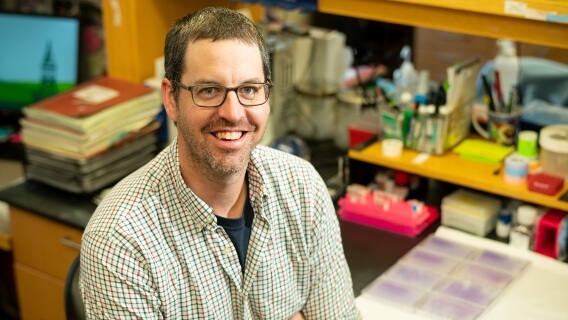University of Vermont Study Opens New Door for Mesothelioma Treatment
Research & Clinical TrialsWritten by Tim Povtak | Edited By Walter Pacheco

Researchers at the University of Vermont Cancer Center have uncovered a new approach to the treatment of malignant pleural mesothelioma, sparking a clinical trial that has opened with considerable anticipation.
The trial involves RSO-021, a novel drug that works by inhibiting a tumor cell’s ability to manage its own toxic waste byproduct.
“The key to the therapy is the universal vulnerability present in these cancer cells that our therapeutic approach interferes with,” University of Vermont professor Brian Cunniff, the study’s lead researcher, told The Mesothelioma Center at Asbestos.com. “These tumor cells generate a lot of waste, and they have to manage that waste appropriately, or it can become toxic.
“We’re killing them from the inside out, essentially,” Cunniff said. “It’s like putting a potato into the tailpipe. The tumor cells choke on their own exhaust.”
Clinical Trial Is First in Humans for RSO-021
RSO-021 therapy has been effective in significantly reducing mesothelioma tumor burden in laboratory and mice models through the inhibition of enzymes in the antioxidant signaling network.
“There has been a lot of research around the intervention that we’re testing, but all with preclinical models,” Cunniff said. “This will be a first in-human study. There is a lot of optimism for this approach, based upon the mechanism of action of this drug. We think we’ve developed a specific therapy that could be very beneficial.”
The phase I/II clinical trial, which will test the safety and efficacy of RSO-021, has begun recruiting patients at eight sites throughout the United Kingdom. The hope is to move into the U.S. in 2022.
Mesothelioma patients will be treated with direct application of the drug to the tumor site through a pleural catheter, a common device used in patients with mesothelioma.
RS Oncology, a small preclinical biotechnical company in Boston focusing on novel therapies and pleural diseases, is sponsoring the study.

University of Vermont Plays Key Role
Cunniff first discovered the potential of the novel therapy in 2007 as a graduate student at the University of Vermont. He is now an assistant professor in the school’s Department of Pathology and Laboratory Medicine.
Cunniff has been working for the past four years in collaboration with RS Oncology and Wake Forest University School of Medicine to prove the anti-tumor activity discovered in his lab and prepare parameters for the potentially groundbreaking clinical trial.
Their work is a prime example of how long the developmental process can take in advancing new treatments for rare diseases.
The Cunniff Lab at the University of Vermont will serve as the primary site for gathering patient samples and translational research within the trial.
Advances in Mesothelioma Treatment Needed
There is no definitive cure for pleural mesothelioma, which is caused almost exclusively by exposure to asbestos, and treatment advancements have been slow.
Although the FDA recently approved an immunotherapy combination for treatment, its effectiveness remains limited. It was the first systemic approval for mesothelioma in 16 years.
While aggressive surgery has helped some patients survive longer, less than a third of those diagnosed even qualify for that option. The five-year survival rate has been estimated at less than 10% of those diagnosed.
“Any new, promising approach for this cancer is a reason for optimism,” Cunniff said. “It’s a very aggressive tumor with very few options in treating it.”
While his research was centered around pleural mesothelioma, Cunniff said there has been considerable data to suggest the approach could provide help with other cancers as well.
“We’re excited about RSO-021 as a novel metabolic therapy,” said Jarrett Duncan, RS Oncology CEO. “This clinical trial is an important step in improving treatment. It shows tremendous promise.”







